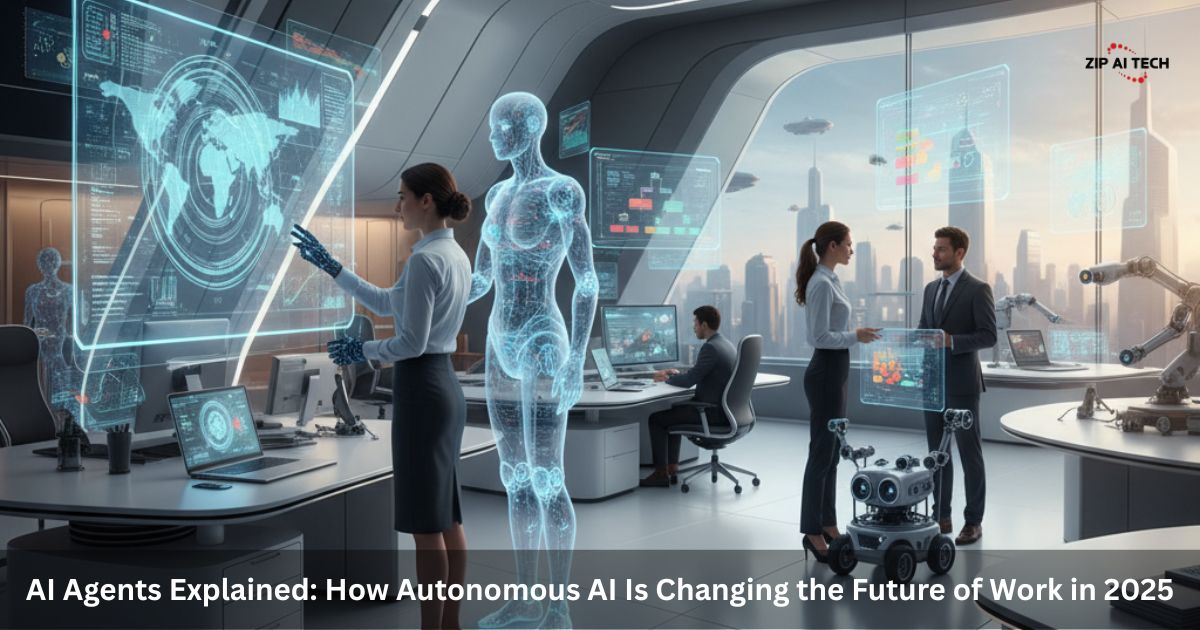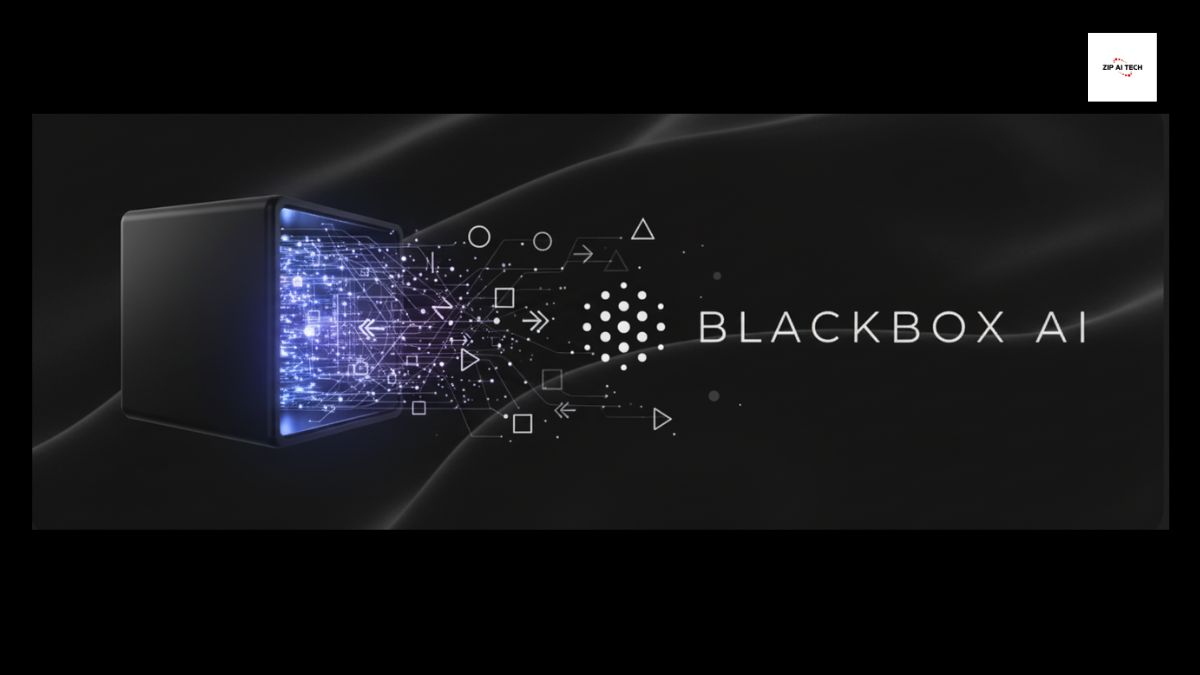What are AI agents and why 2025 matters
At its simplest, an AI agent is a software system that can take actions toward a goal with some level of autonomy — planning, calling tools, and iterating without constant human prompts. When we talk about agentic AI, we mean systems that don’t just respond; they set sub-goals, plan steps, and execute workflows across services. That’s the shift from passive assistants to proactive digital coworkers.
Why 2025? Many major consultancies, cloud providers, and enterprise vendors say 2025 is the tipping point where pilots and early production agentic systems move into broader adoption — not because agents suddenly became “sentient,” but because orchestration, LLM capability, and cloud integration matured enough for practical enterprise pilots.
What is agentic AI? A short definition
Agentic AI = autonomous systems that receive a high-level goal and then plan, act, evaluate, and adapt using internal reasoning plus external tools (APIs, databases, automation). These systems often rely on multi-step planning and can coordinate multiple specialist agents to reach complex goals. In short: agentic AI acts, not just answers.
AI agents vs chatbots: key differences
People use “chatbot” loosely, but chatbots typically respond to single-turn user queries. AI agents can sequence tasks: research, call APIs, create documents, and even perform transactions. Think of chatbots as conversational tools and AI agents as short-order project teams that can act across systems.
How AI agents actually work (basic architecture)
At a high level, an agent stack includes:
- LLM or reasoning core that generates plans and makes decisions.
- Tooling / connectors (APIs, plugins) to execute actions—send emails, call databases, run workflows.
- Orchestration to coordinate multiple agents or steps.
- Feedback loop and monitoring to validate outcomes and retry failed steps.
Single agent vs multi-agent systems
A single agent might handle an invoice approval workflow; a multi-agent system splits work among specialized agents (data gatherer, summarizer, actioner) that coordinate to complete a campaign or solve a complex problem. Multi-agent orchestration is often how businesses scale agentic capabilities.
Orchestration, tools, and feedback loops
Orchestration layers (Copilot Studio, Workbench tools, custom platforms) give managers visibility and controls. Good systems include fallbacks—if an agent fails, human review or a retry policy kicks in—reducing risk in real workflows.
Top use cases for AI agents in the workplace (2025)
Here are where agents make immediate sense:
Customer service and sales automation
AI agents can handle end-to-end tasks: triage support tickets, run knowledge base lookups, issue refunds, or create follow-up campaigns — with human oversight. This reduces turnaround and frees humans for higher-value exceptions.
Knowledge work support: research, summaries, action
Agents can summarize documents, compile competitive research, draft emails, and initiate action items — turning an ask into a near-complete deliverable for a human to finalize. That’s transformational for productivity.
IT, ops, and security monitoring
Agents monitor logs, detect anomalies, open tickets, and sometimes apply fixes (with guardrails). They can work continuously and reduce human on-call fatigue.
Why businesses are adopting agentic AI now
Productivity and 24/7 automation
Agents operate around the clock, scaling tasks that previously required teams across time zones. Many organizations report pilot productivity gains that justify further investment.
Scalability and workforce augmentation
Rather than replacing staff, early adopters often use agents to augment employees — the agent handles routine work and the human adds judgment. This is why many vendors pitch a future with “AI colleagues.”
Benefits for workers — and real risks
Augmentation, not always replacement
When done right, agentic AI reduces repetitive work and helps workers focus on creativity and strategy. Roles will evolve: managers become “agent bosses” overseeing AI teammates.
Job displacement, skill shifts, and new roles
However, macro concerns are real — some tasks will be automated away and workforce reskilling is essential. Institutions warn of both productivity gains and potential job exposure; planning and policy will matter.
Technical & practical limitations of AI agents in 2025
Compounded error rates and brittle workflows
Autonomous multi-step actions amplify small errors. Agents that chain many steps face a “compounded error” problem: a small mistake early can produce large downstream failures. This is a major reason pilots include human-in-loop checks. Experts caution that fully reliable, general-purpose agents remain an open challenge.
Data quality, hallucinations and trust
Agent decisions are only as good as their data. Poor input (bad document scans, stale data) leads to wrong actions—“garbage in, agentic out.” Strong data governance and validation are critical before placing agents in control.
Ethics, governance & safety for agentic systems
Human-in-the-loop and oversight patterns
Designs often require escalation points, approvals, and transparent logs. “Agent bosses” need visibility into agent reasoning and the ability to intervene. Audit trails and role-based access become non-negotiable.
Audit trails, explainability, and compliance
Regulated industries must show traceability for decisions. Explainable actions, immutable logs, and policy constraints help make agentic systems auditable and safer for production use.
How to evaluate an AI-agent project at your company
Pilot metrics and ROI signals
Measure: time saved per task, error/rework rate, customer satisfaction, and total cost of ownership. Early pilots should focus on narrowly scoped, high-frequency tasks to minimize risk and maximize learning.
Data and engineering readiness checklist
- Clean, accessible data sources
- Clear APIs and action endpoints
- Monitoring & alerting infrastructure
- Security reviews and compliance checks
If you can’t answer these yes/no questions easily, delay large-scale agent rollouts until infrastructure is ready.
Tools, platforms, and ecosystem (who’s building agents)
Major cloud vendors, enterprise AI startups, and platforms are shipping agent frameworks and orchestration tools. Expect platforms labelled as “copilot studios,” “agent orchestration,” or “agentic platforms.” These provide the building blocks (LLMs + connectors + governance). Choose platforms that offer tight auditability and plugin ecosystems.
Practical steps for employees: how to work with AI agents
Designing prompts and supervising agents
Think of prompts as job descriptions for agents. Be explicit: define goals, constraints, data sources, and success conditions. Pair agents with short-checkpoint reviews and quality gates.
Skill upgrades to stay relevant
Learn to: design experiments for agents, interpret agent outputs, fix edge-case failures, and do domain oversight. Upskilling in prompt engineering, data literacy, and automation design will be high ROI.
Scenarios: 3 short real-world examples
Example 1 — Sales campaign built by agents
An orchestrator agent pulls CRM data, drafts personalized outreach, schedules follow-ups, and generates a performance dashboard. Sales reps only review and close high-value leads.
Example 2 — IT incident autonomously triaged
A monitoring agent detects abnormal behavior, runs diagnostics, escalates to human team with a pre-populated remediation checklist, and in low-risk cases, applies automated fixes.
Example 3 — Research assistant does first-draft work
A knowledge agent ingests reports, extracts key facts, drafts an executive summary, and suggests action items. The human reviewer edits and publishes faster than before.
What to watch in 2026 and beyond
Watch for improved continual learning (agents that really learn from deployed experience), stronger multi-agent collaboration patterns, and stricter regulation around agentic autonomy. Experts debate timelines — some warn full general-purpose agents may take years, others expect rapid vertical adoption. Both views shape realistic strategies.
Conclusion
AI agents and agentic AI are not sci-fi fantasies but practical tools changing how work gets done in 2025. They excel at scaling routine, repeatable workflows, augment human teams, and improve responsiveness — provided organisations address data quality, governance, oversight, and reskilling. If your company pilots agents, start small, measure carefully, and build human controls into the design. The future isn’t “agents replace humans”; it’s “agents augment humans — and those who learn to manage them will lead the change.”
Follow us for more AI and tech updates:
Facebook | Instagram | Pinterest
FAQs
Q1: What exactly are AI agents and how do they differ from chatbots?
A: AI agents are autonomous systems that plan and act to achieve goals, often using multiple steps and external tools. Chatbots mainly carry out single-turn or scripted conversations. Agents execute workflows; chatbots converse.
Q2: What is agentic AI and why is it important for companies?
A: Agentic AI is the paradigm of autonomous, goal-driven AI agents that can plan and execute tasks. It’s important because it enables end-to-end automation of complex workflows, increasing efficiency and scaling human capabilities.
Q3: Are AI agents safe to use in production today?
A: Many agentic pilots are in production, but safety depends on use case, data quality, and governance. For high-risk tasks, human oversight and strict auditability are essential.
Q4: Will AI agents take people’s jobs?
A: Agents will automate some tasks and shift skills required for many roles. While some displacement is possible, many experts expect augmentation and new job categories (agent operators, overseers, prompt engineers). Policies and reskilling will shape outcomes.
Q5: How should my company start with agentic AI?
A: Start with a small, high-frequency workflow; ensure data quality; set clear success metrics; include human-in-loop checks; and measure ROI before scaling. Use pilot learnings to build governance and compliance.
About the Author
Written by: Bal Kishan
Founder, Zipaitech.com — a platform focused on AI, automation, and SEO innovation.
With years of experience in AI-powered marketing and digital transformation, Bal Kishan shares practical insights to help businesses harness artificial intelligence for growth and productivity.





4 thoughts on “AI Agents Explained: How Autonomous AI Is Changing the Future of Work in 2025”